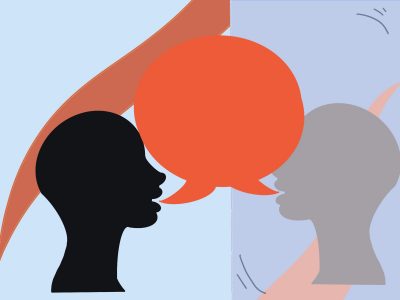As mask mandates are lifted across the country, I’ve found myself hesitant to comply. Over the past two years, I’ve found comfort in hiding behind my mask — I quite literally can “mask” my insecurities and early-morning scowls.
Taking my mask off has uncovered more than the occasional blemish or sleep-deprived countenance — I’ve uncovered my subconscious habit of self-talk.
When I refer to self-talk, I’m not referring to occasionally muttering under my breath. I’m talking about a methodical vocalization of my inner dialogue.
It’s important to differentiate between healthy self-talk and self-talk that is cause for concern. Respectively, this is “knowingly engaging in dialogue with yourself versus engaging with a perceived external source.”
It’s also important to note that I’m specifically advocating for the normalization of overt self-talk, where words are actually spoken aloud to oneself rather than through an internal, nonverbal dialogue.
It’s time we normalize talking to ourselves, and move away from the social stigma that too often equates it with hallucinatory behavior.
Talking to yourself is like a pressure valve, a 2014 study found that self-talk is particularly effective at reducing stress among those with social anxiety.
I see self-talk as analogous to journaling. They both require the psychological process of active introspection, in which the self being reflected upon is separated from the self doing the reflecting. In other words, creating distance from “distressing feelings” through a pseudo-third-person perspective creates space that allows for a more level-headed regulation of emotions.
Dr. Jessica Nicolosi, a clinical psychologist, described the phenomenon in an NBC News interview, saying, “If we speak out loud, it forces us to slow down our thoughts and process them differently because we engage the language centers of our brain. By talking to ourselves we become more deliberate, and this creates a slower process to think, feel and act, instead of being bombarded by our thoughts.”

Self-talk is clearly beneficial, but some experts argue these benefits are reaped only from particular forms of self-talk. As Dr. Nicolosi continues, “The focus is less on whether [my patients] talk to themselves, and more about the content of those conversations.”
The content of self-talk can be roughly categorized as positive, negative or neutral. Unsurprisingly, positive self-talk is proven to be more beneficial than its negative counterpart. So if you do engage in self-talk, be cognizant of the way you speak to yourself because a dialogue of constant self-deprecation is sure to become harmful.
Try to focus on either neutral self-talk — navigating through tasks or emotions as a third-party observer as if reading instructions — or positive self-talk through supporting and encouraging certain feelings to increase mood, concentration or control.
Athletes often use the latter form of self-talk to improve control over their cognitive functions, which translates into increased performance of motor functions.
Talking to yourself works, whether you want to calm yourself down from your spiraling emotions, improve your concentration before an important meeting or simply work through a difficult task at hand.
Since COVID and the subsequent mask mandates, talking to yourself has become even more necessary, serving for many as a means of coping with the added pressures and anxieties of pandemic life — and it’s never been easier to do so without others knowing.
But as the mask mandates recede, we’re faced with pressure to transition to a post-pandemic, pre-endemic life without the shield of a mask to hide the coping mechanism of self-talk.
In advocating for the normalization of self-talk in a post-pandemic world, I’ve come to realize that there is a deeper issue at hand — namely, the stigma around hallucinatory and schizophrenic behavior. Our societal aversion to self-talk stems from our equivocation of it to unstable or schizophrenic behavior.
While it’s beyond the scope of this article to adequately address that stigma, advocating for the normalization of self-talk implies concurrently advocating for greater awareness about the harmful effects of this and other stigmas on populations with certain mental health conditions.
The embarrassment we feel when caught talking to ourselves reflects the fear of being associated with certain mental health conditions and being branded with the disparaging label of “crazy.” While I believe we should all engage in more self-talk to improve our focus or sort through difficult emotions, in doing so we must also broaden our social discourse so that we can work toward lessening the detrimental stigma associated with mental health and schizophrenia in particular.






















































































































